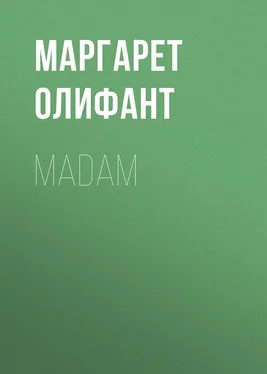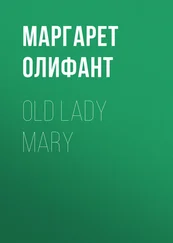Маргарет Олифант - Madam
Здесь есть возможность читать онлайн «Маргарет Олифант - Madam» — ознакомительный отрывок электронной книги совершенно бесплатно, а после прочтения отрывка купить полную версию. В некоторых случаях можно слушать аудио, скачать через торрент в формате fb2 и присутствует краткое содержание. Жанр: foreign_prose, literature_19, foreign_antique, на английском языке. Описание произведения, (предисловие) а так же отзывы посетителей доступны на портале библиотеки ЛибКат.
- Название:Madam
- Автор:
- Жанр:
- Год:неизвестен
- ISBN:нет данных
- Рейтинг книги:5 / 5. Голосов: 1
-
Избранное:Добавить в избранное
- Отзывы:
-
Ваша оценка:
- 100
- 1
- 2
- 3
- 4
- 5
Madam: краткое содержание, описание и аннотация
Предлагаем к чтению аннотацию, описание, краткое содержание или предисловие (зависит от того, что написал сам автор книги «Madam»). Если вы не нашли необходимую информацию о книге — напишите в комментариях, мы постараемся отыскать её.
Madam — читать онлайн ознакомительный отрывок
Ниже представлен текст книги, разбитый по страницам. Система сохранения места последней прочитанной страницы, позволяет с удобством читать онлайн бесплатно книгу «Madam», без необходимости каждый раз заново искать на чём Вы остановились. Поставьте закладку, и сможете в любой момент перейти на страницу, на которой закончили чтение.
Интервал:
Закладка:
Young Hamerton in the conservatory naturally had none of these fears. He thought that old Trevanion was (as indeed everybody knew) an old tyrant, a selfish, ill-tempered egoist, caring for nothing but his own indulgences. How he did treat that poor woman, to be sure! a woman far too good for him whether it was true or not that he had married her without a penny. He remembered vaguely that he had never heard who Madam Trevanion was before her marriage. But what of that? He knew what she was: a woman still full of grace and charm, though she was no longer in her first youth. And what a life that old curmudgeon, that selfish old skeleton, with all his fantastical complaints, led her! When a young man has the sort of chivalrous admiration for an elder woman which Roland Hamerton felt for the mistress of this house, he becomes sharp to see the curious subjection, the cruelty of circumstances, the domestic oppressions which encircle so many. And Madam Trevanion was more badly off, more deeply tried, than any other woman, far or near. She was full of spirit and intelligence, and interest in the higher matters of life; yet she was bound to this fretful master, who would not let her out of his sight, who cared for nothing better than a society newspaper, and who demanded absolute devotion, and the submission of all his wife’s wishes and faculties to his. Poor lady! no wonder if she were glad to escape now and then for a moment, to get out of hearing of his sharp voice, which went through your ears like a skewer.
While these thoughts went through young Hamerton’s mind he had gradually made his way through the conservatory, in which there was but one dim lamp burning, to the farther part, which projected out some way with a rounded end into the lawn which immediately surrounded the house. He was much startled, as he looked cautiously forth, without being aware that he was looking, to see something moving, like a repetition of the waving branches and clouds above close to him upon the edge of a path which led through the park. At first it was but movement and no more, indistinguishable among the shadows. But he was excited by what he had been hearing, and his attention was aroused. After a time he could make out two figures more or less distinct, a man he thought and a woman, but both so dark that it was only when by moments they appeared out of the tree-shadows, with which they were confused, against the lighter color of the gravel that he could make them out. They parted while he looked on; the man disappeared among the trees; the other, he could see her against the faint lightness of the distance, stood looking after the retreating figure; and then turned and came towards the house. Young Hamerton’s heart leaped up in his breast. What did it mean? Did he recognize the pose of the figure, the carriage of the head, the fine movement, so dignified yet so free? He seized hold on himself, so to speak, and put a violent stop to his own thoughts. She! madness! as soon would he suppose that the queen could do wrong. It must be her maid, perhaps some woman who had got the trick of her walk and air through constant association: but she—
Just then, while Hamerton retired somewhat sick at heart, and seated himself near the door of the conservatory to recover, cursing as he did so the sharp, scolding tones of Mr. Trevanion going on with his grievances, Rosalind, standing against the pillar, was startled by something like a step or faint stir outside, and then the sound, which would have been inaudible to faculties less keen and highly strung, of the handle of the glass door. It was turned almost noiselessly and some one came in. Some one. Whom? With a shiver which convulsed her, Rosalind watched: this dark figure might be any one—her mother’s maid, perhaps, even Russell, gone out to pry and spy as was her way. Rosalind had to clutch the pillar fast as she watched from behind while the new-comer took a shawl from her head, and, sighing, arranged with her hands her head-dress and hair. Whatever had happened to her she was not happy. She sighed as she set in order the lace upon her head. Alas! the sight of that lace was enough, the dim light was enough: no one else in the house moved like that. It was the mother, the wife, the mistress of Highcourt, Madam Trevanion, whom all the country looked up to for miles and miles around. Rosalind could not speak. She detached her arms from the pillar and followed like a white ghost as her stepmother moved towards the drawing-room. In the night and dark, in the stormy wind amid all those black trees, where had she been?
CHAPTER III
“I married her without a penny,” Mr. Trevanion was saying. “I was a fool for my pains. If you think you will purchase attention and submission in that way you are making a confounded mistake. Set a beggar on horseback, that’s how it ends. A duke’s daughter couldn’t stand more by her own way; no, nor look more like a lady,” he added with a sort of pride in his property; “that must be allowed her. I married her without a penny; and this is how she serves me. If she had brought a duchy in her apron, or the best blood in England, like Rosalind’s mother, my first poor wife, whom I regret every day of my life— O-h-h!—so you have condescended, Madam, to come at last.”
She was a tall woman, with a figure full of dignity and grace. If it was true that nobody knew who she was, it was at least true also, as even her husband allowed, that she might have been a princess so far as her bearing and manners went. She was dressed in soft black satin which did not rustle or assert itself, but hung in long sweeping folds, here and there broken in outline by feathery touches of lace. Her dark hair was still perfect in color and texture. Indeed, she was still under forty, and the prime of her beauty scarcely impaired. There was a little fitful color on her cheek, though she was usually pale, and her eyes had a kind of feverish, suspicious brightness like sentinels on the watch for danger signals. Yet she came in without hurry, with a smile from one to another of the group of gentlemen, none of whom showed, whatever they may have felt, any emotion. John Trevanion, still blank and quiet against the firelight; the doctor, though he lifted his eyes momentarily, still dropping through his hands, back and forwards, the sliding, smooth surfaces of the cards. From the dimness in the background Hamerton’s young face shone out with a sort of Medusa look of horror and pain, but he was so far out of the group that he attracted no notice. Mrs. Trevanion made no immediate reply to her husband. She advanced into the room, Rosalind following her like a shadow. “I am sorry,” she said calmly, “to be late: have you not begun your rubber? I knew there were enough without me.”
“There’s never enough without you,” her husband answered roughly; “you know that as well as I do. If there were twice enough, what has that to do with it? You know my play, which is just the one thing you do know. If a man can’t have his wife to make up his game, what is the use of a wife at all? And this is not the first time, Madam; by Jove, not the first time by a dozen. Can’t you take another time for your nap, or your nursery, or whatever it is? I don’t believe a word of the nursery. It is something you don’t choose to have known, it is some of your low—”
“Rosalind, your father has no footstool,” said Mrs. Trevanion. She maintained her calm unmoved. “There are some fresh cards, doctor, in the little cabinet.”
“And how the devil,” cried the invalid, in his sharp tones, “can I have my footstool, or clean cards, or anything I want when you are away—systematically away? I believe you do it on purpose to set up a right—to put me out in every way, that goes without saying, that everybody knows, is the object of your life.”
Читать дальшеИнтервал:
Закладка:
Похожие книги на «Madam»
Представляем Вашему вниманию похожие книги на «Madam» списком для выбора. Мы отобрали схожую по названию и смыслу литературу в надежде предоставить читателям больше вариантов отыскать новые, интересные, ещё непрочитанные произведения.
Обсуждение, отзывы о книге «Madam» и просто собственные мнения читателей. Оставьте ваши комментарии, напишите, что Вы думаете о произведении, его смысле или главных героях. Укажите что конкретно понравилось, а что нет, и почему Вы так считаете.












